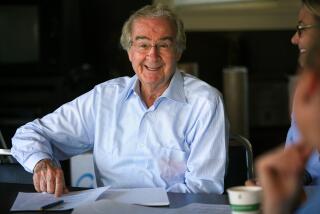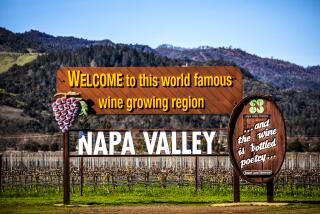Al Brounstein, 86; Founded Diamond Creek Vineyards
- Share via
Al Brounstein, a pharmaceutical salesman turned vintner whose Diamond Creek Vineyards’ Cabernet Sauvignon wines spawned a devoted following, has died. He was 86.
Brounstein died June 26 at his home in Calistoga, Calif., after a long battle with Parkinson’s disease, the winery announced.
Diamond Creek Vineyards was among the first of Napa Valley’s boutique wineries to produce limited quantities of single-vineyard wines and make them available only to a small core of mailing-list subscribers and gourmet restaurants.
Brounstein was the first California vintner to top the $100 mark for a 750-milliliter bottle, with the 1978 Lake Cabernet Sauvignon. He specialized in these “cult Cabernets” and made no apologies for their staggering prices.
“We feel if we make a real quality product, people will be willing to pay for it,” he said several years ago. “They don’t get this kind of wine from every Tom, Dick and Harry.”
What set Diamond Creek Vineyards’ wines apart, he said, was the painstaking attention paid to the winemaking process and the particular characteristics of the land itself.
The land was 79 acres on a hillside in the northwest corner of Napa Valley that he bought for a little more than $100,000 in 1967. The seller had intended to build a nine-hole golf course, but Brounstein prepared three small plots for the planting of grapes -- Volcanic Hill, Red Rock Terrace and Gravelly Meadow. He later added another tiny section called Lake.
On these 20 acres he planted Cabernet Sauvignon grapes, using cuttings from Bordeaux that he smuggled into California via Tijuana to avoid a lengthy quarantine.
Brounstein wasn’t indigenous to Napa either.
Born Feb. 17, 1920, in the Canadian province of Saskatchewan, Albert Jack Brounstein grew up in Minneapolis and graduated from the University of Minnesota in 1942 with a business degree. Soon after, he made a February visit to Los Angeles and fell in love with the temperate weather. He started a wholesale business distributing beauty supplies and over-the-counter drugs.
Brounstein’s appreciation of wine started modestly -- “Why would anyone want to have anything besides Paul Masson Vin Rose?” was how he expressed it -- and led him to a UCLA Extension course in wine appreciation. He also took a French-language course, which led him to France to learn firsthand about winemaking.
He decided to give up pharmaceuticals and apply his business background to his new passion. He insisted on single-vineyard wines, following the traditional methods of the grand French estates, to maximize the qualities of the soil and climate of each distinctive growing area. With the help of winemaker Jerry Luper, Brounstein released his first Diamond Creek wine with the 1972 vintage.
The focus was on Cabernet Sauvignon, although Brounstein planted a small amount of a few other red Bordeaux varietals for blending. From the start, Diamond Creek’s production was low and the wines, typical of Napa Cabernets, required several years of aging. The wines were well received, the prices breathtaking.
“We were in the red for the first 15 years, but we stuck with it,” Brounstein told the San Francisco Chronicle in 1994. “And I have to admit it -- we’re making very good money now.”
The winery continues to produce only a few thousand cases a year under current winemaker Phil Steinschriber. And the wines still sell at a premium, with some bottles carrying a $350 price tag, although they can command even higher prices at auction.
Brounstein is survived by his second wife, Boots; son Gary Brounstein; stepsons Phil Ross and Chuck Ross; five grandchildren; and one great-grandchild. His first wife, Nancy Ravitch, died in 1965.
Services were private. A celebration of Brounstein’s life will be held July 27 at the Culinary Institute of America in St. Helena, Calif.
More to Read
Eat your way across L.A.
Get our weekly Tasting Notes newsletter for reviews, news and more.
You may occasionally receive promotional content from the Los Angeles Times.










